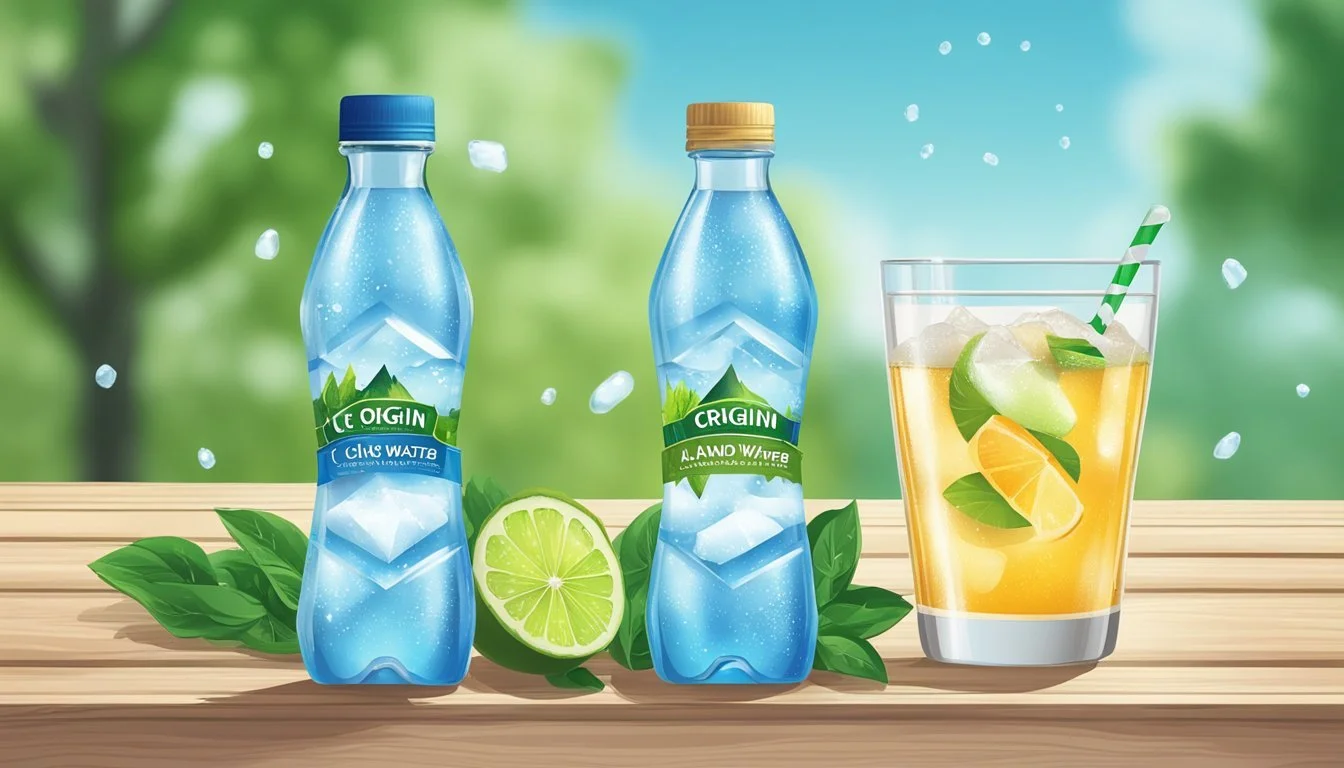Ice Mountain vs. Origin
Which Bottled Water is Better? Comprehensive Comparison
Choosing between Ice Mountain and Origin bottled water can be daunting given the multitude of factors to consider such as taste, quality, and sourcing. Ice Mountain offers a refreshing taste combined with strong regional availability in the Midwest, making it a convenient choice for many consumers. Origin, on the other hand, prides itself on premium quality and sustainable practices, potentially appealing to a different demographic.
Taste is subjective, yet crucial when selecting bottled water. Ice Mountain is often praised for its crisp, clean flavor. Origin, meanwhile, provides a smooth and pure taste from carefully selected sources. These differences can significantly influence consumer preferences and purchases.
Considerations also extend to environmental impact and packaging. Ice Mountain utilizes widely recyclable plastic bottles, yet faces challenges with recycling rates. Origin emphasizes eco-friendly packaging with options like biodegradable materials, catering to environmentally-conscious buyers. Each brand brings unique attributes to the market, offering valuable choices based on varying priorities.
Understanding Bottled Water
Bottled water encompasses various types distinguished by their sources, mineral content, and purification processes. Evaluating the quality and purity involves examining both the production methods and the ingredients present.
Defining Bottled Water Types
There are several types of bottled water, each with distinct characteristics:
Spring Water: Sourced from natural springs, it maintains naturally occurring minerals. Examples include Mountain Valley Spring Water.
Mineral Water: Contains a specific amount of dissolved minerals, sourced directly from mineral springs.
Alkaline Water: Has a higher pH level than regular water, often enhanced with alkaline additives.
Purified Water: Undergoes processes like distillation or reverse osmosis to remove impurities. Brands like Ice Mountain use multi-step filtration methods.
Understanding these types helps in determining the best fit for personal preferences based on flavor and health benefits.
Assessing Water Quality and Purity
Water quality and purity are critical factors:
pH Levels: The pH level indicates how acidic or alkaline the water is, impacting both taste and health benefits.
Filtration Processes: Methods like reverse osmosis or charcoal filtration remove contaminants, enhancing purity. Ice Mountain employs multi-step filtration to ensure safety.
Mineral Content: Natural minerals can affect both flavor and health benefits. Spring and mineral waters are typically rich in minerals, which can be advantageous.
Contaminant Levels: Testing for impurities such as lead, chlorine, or other hazardous substances is essential to guarantee safety.
By analyzing these factors, consumers can make informed choices about the bottled water that best suits their needs.
Comparing Ice Mountain and Origin
This section will cover the key differences and similarities between Ice Mountain and Origin bottled waters, focusing on their source, production methods, and taste profile.
Source and Origin
Ice Mountain derives its water from multiple natural springs located in the Midwest region. These springs are selected based on the purity and mineral content of the water.
Origin, in contrast, sources its water from carefully protected artesian aquifers in Iceland. These sources are known for their pristine quality and low environmental impact.
The geographical difference in sources lends a unique character to each brand. Ice Mountain's reliance on multiple springs may result in slight variations in taste, while Origin's singular source provides consistency.
Production and Purification Process
Ice Mountain uses a multi-step filtration process for its water.
Screening removes large particles.
Reverse Osmosis ensures the removal of smaller, dissolved solids.
Ultraviolet Light and Ozonation are used to eliminate any remaining bacteria or pathogens, ensuring the safety and purity of the water.
Origin also employs rigorous purification methods:
They utilize double filtration and natural mineral balancing to maintain the natural flavor and minerals in the water.
No artificial additives are used in Origin's production, sticking closely to its natural state.
This meticulous attention to each step in the filtration process ensures high standards of purity for both brands.
Taste Profile
Ice Mountain is often described as having a crisp, clean taste with a slight mineral hint inherited from its spring sources. The consistency can vary subtly due to the multiple springs used.
Origin, on the other hand, provides a smooth and refreshing taste, noted for its silky texture and subtle sweetness drawn from its Icelandic aquifers.
Both waters are free from strong aftertastes, but Origin's single-source origin may appeal to those seeking a consistent drinking experience.
_<?otland
Health and Hydration
Ice Mountain and Origin water both offer unique health benefits and hydration effectiveness. They differ in mineral content and how they support daily hydration needs.
Mineral Benefits
Ice Mountain contains essential minerals like calcium, magnesium, and potassium. These minerals support bone health and muscle function.
Calcium in Ice Mountain water is crucial for maintaining strong bones. Magnesium aids in metabolic processes and muscle relaxation. Potassium regulates fluid balance and supports cardiovascular health.
Origin water, sourced from pure environments, retains natural minerals. It has a balanced mineral composition beneficial for overall health. Consumers seeking a natural mineral boost may prefer Origin.
Hydration Effectiveness
Ice Mountain ensures effective hydration with a neutral pH balance. Its clean taste makes it an excellent choice for daily consumption.
Origin water also provides efficient hydration, often boasting a balanced pH level. Its natural purity ensures refreshing and effective hydration without added chemicals or preservatives.
Both brands deliver high-quality hydration, making them suitable for various lifestyle needs.
Packaging and Sustainability
When comparing the packaging and sustainability efforts of Ice Mountain and Origin bottled water, it's essential to examine the materials used and how each brand addresses recycling and waste management.
Materials and Environmental Impact
Ice Mountain typically uses 100% plastic bottles made from petrochemicals, derived from oil. These bottles are known for their durability and practicality. However, the production of plastic bottles has a significant environmental impact, contributing to fossil fuel consumption and greenhouse gas emissions.
In contrast, Origin focuses on more sustainable packaging. Origin often uses paper cartons that are eco-friendly and sourced from sustainable forests. These cartons have a lower carbon footprint compared to traditional plastic bottles. The choice of materials showcases Origin’s commitment to reducing environmental impact and promoting sustainability.
Recycling and Waste Management
Ice Mountain’s plastic bottles are widely recyclable, but the actual recycling rates remain low. Many communities have facilities to recycle plastic, but not all consumers dispose of the plastic bottles correctly. To combat this, Ice Mountain has introduced bottles made with 100% recycled plastic (rPET), aiming to enhance their recycling efforts.
Origin’s paper cartons are recyclable where facilities exist. Recycling rates for paper cartons are typically higher in communities with proper facilities. By using easily recyclable materials and promoting sustainable practices, Origin further reduces waste and encourages environmentally responsible behavior among consumers.
These points highlight the distinct approaches each brand takes regarding packaging materials and their commitment to sustainability.
Flavor and Additives
The flavor of bottled water can be influenced by several factors, including natural flavors inherent to the source and added electrolytes or minerals. Let's explore how Ice Mountain and Origin compare in these aspects.
Natural Flavors
Ice Mountain sources its water from natural springs, which inherently contain various minerals. These minerals give Ice Mountain a subtle yet distinct flavor that many consumers appreciate. The taste is often described as refreshing and not overbearing, making it a popular choice for everyday drinking.
Origin, on the other hand, sources its water from carefully selected and protected springs. This also gives it a clean and crisp taste. The focus on maintaining the purity of the water ensures that the natural flavors are not masked or altered significantly.
Added Electrolytes and Minerals
Ice Mountain does not add electrolytes or minerals to its water. The flavor remains natural, derived solely from the spring sources. What you taste is simply the result of authentic spring water with naturally occurring minerals.
In contrast, Origin may enhance its water with added electrolytes. These additions appeal to those seeking hydration with extra benefits, such as increased electrolytes for better muscle function and recovery. The added minerals can also subtly influence the flavor, making it slightly more pronounced than plain spring water.
Both Ice Mountain and Origin cater to different preferences regarding additives, offering options for consumers depending on their specific hydration needs and flavor profiles.
Consumer Considerations
When choosing between Ice Mountain and Origin bottled water, consumers must weigh their personal preferences and lifestyle needs along with cost and accessibility factors.
Personal Preferences and Lifestyle
Personal taste and lifestyle play a significant role in selecting bottled water. Ice Mountain is known for its spring water sourced from natural springs, often appreciated for its crisp taste.
Origin bottled water, on the other hand, may offer unique filtration processes or added minerals that appeal to those seeking specific health benefits.
Convenience also matters. Ice Mountain is available in a variety of sizes and packaging options, making it suitable for on-the-go hydration. Those who prioritize sustainability may prefer options with reusable or recyclable packaging.
Cost Factor and Accessibility
Cost is a vital aspect for many consumers. Ice Mountain, being a widely distributed brand, often has competitive pricing due to its large production scale.
Availability in local stores or online can also be an essential factor. Origin might be priced differently, possibly higher, if it focuses on premium quality or specific health claims.
Accessibility also includes regional availability, which can vary. Ice Mountain's extensive distribution network ensures it is commonly found in various retail stores. If consumers prioritize eco-friendly packaging or minimal environmental footprint, these factors could influence their decision towards one brand over the other.
The Market Landscape of Bottled Water
In the bottled water market, competition is fierce, and consumer preferences are continually evolving. Leading brands, as well as innovative newcomers, shape this dynamic industry.
Top Competing Brands
Several brands dominate the bottled water industry, each with unique selling points. Nestlé owns Ice Mountain, known for its multi-step filtration, and Smartwater, celebrated for its vapor-distillation process. Fiji Water is touted for its artesian aquifer origin, while Dasani and Aquafina are market leaders owned by Coca-Cola and PepsiCo respectively. Essentia differentiates itself with ionized alkaline water, attracting health-conscious consumers. Icelandic Glacial emphasizes its natural spring source and purity.
Emerging Trends in Consumer Demand
There is a growing demand for eco-friendly packaging and transparent sourcing. Brands like Boxed Water promote recyclable paper cartons, contrasting with traditional plastic bottles from companies like Ice Mountain. Wellness trends push sales of products like Core Hydration, which focuses on balanced pH and added electrolytes. Ethical considerations also influence choices, with Ethos Water's mission to fund water programs in developing countries gaining traction.
Final Verdict
When comparing Ice Mountain and Origin, several factors come into play, influencing the decision for consumers.
Taste and Quality:
Ice Mountain emphasizes a crisp, fresh taste with water sourced from natural springs. Origin, often marketed as a premium product, focuses on purity and a smooth palate to appeal to health-conscious consumers.
Source and Purity:
Ice Mountain, owned by BlueTriton Brands, sources its water from natural springs in the U.S. Origin, associated with PepsiCo, is known for its rigorous filtration processes to ensure high purity and a balanced mineral content.
Environmental Impact:
The environmental footprint of each brand is a crucial consideration. Ice Mountain has implemented sustainable practices in sourcing and packaging to reduce its impact. Origin also prioritizes eco-friendly measures, including recyclable packaging and efficient water usage.
Accessibility and Price:
Ice Mountain is widely available in North America and tends to be more affordable. Origin, positioned as a premium brand, may come at a higher price point and is accessible in select markets.
Consumer Preferences:
Consumers seeking affordability and widespread availability might lean towards Ice Mountain. Those prioritizing rigorous filtration and a premium experience could prefer Origin.
In conclusion, the choice between Ice Mountain and Origin ultimately depends on individual preferences regarding taste, source, environmental consciousness, and price.
More About Ice Mountain
Core Hydration vs Ice Mountain: Which Bottled Water is Better?
Ice Mountain vs Aqua Carpatica: Which Bottled Water is Better?
Ice Mountain vs Cascade Mountain: Which Bottled Water is Better?
Ice Mountain vs Crystal Geyser: Which Bottled Water is Better?
Ice Mountain vs Crystal Lake: Which Bottled Water is Better?
Ice Mountain vs Essence pH10: Which Bottled Water is Better?
Ice Mountain vs Hawaii Volcanic: Which Bottled Water is Better?
Ice Mountain vs Hawaiian Springs: Which Bottled Water is Better?
Ice Mountain vs Icelandic Glacial: Which Bottled Water is Better?
Ice Mountain vs Kirkland Signature: Which Bottled Water is Better?
Ice Mountain vs Liquid Death: Which Bottled Water is Better?
Ice Mountain vs Mountain Valley Spring Water: Which Bottled Water is Better?
Ice Mountain vs Nestle Pure Life: Which Bottled Water is Better?
Ice Mountain vs Poland Spring: Which Bottled Water is Better?
Ice Mountain vs Proud Source: Which Bottled Water is Better?
Ice Mountain vs Purely Sedona: Which Bottled Water is Better?
Ice Mountain vs Richard's Rainwater: Which Bottled Water is Better?
Ice Mountain vs San Pellegrino: Which Bottled Water is Better?
Ice Mountain vs Simple Truth: Which Bottled Water is Better?
Ice Mountain vs Solan de Cabras: Which Bottled Water is Better?
Ice Mountain vs Talking Rain AQA: Which Bottled Water is Better?
Ice Mountain vs Whole Foods 365: Which Bottled Water is Better?
Ice Mountain vs Whole Foods Italian Still Mineral water: Which Bottled Water is Better?







